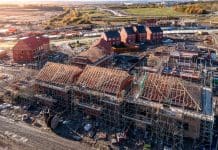The August 2024 PMIs showed a continued recovery in UK construction output, attributed to robust new order growth and a more supportive economic background
The headline S&P Global UK Construction Purchasing Managers’ Index (PMI) sat at 53.6 in August 2024- lower than July’s 26-month high of 55.3, but still representing overall growth in the sector.
This was also the sixth consecutive month that the index registered above the 50.0 no-change value.
Although slower than in July, total business activity remained strong in August
Commercial activity performed best at an index of 53.7, with a number of firms observing a boost from rising sales inquiries and the release of new orders post-election.
Civil engineering expanded at a more moderate pace (51.8), weaker than July.
The sub-sector of residential work was unique in its gain of momentum, with growth accelerating at the fastest pace in the last two years(52.7).
Housing activity also increased, in tandem with a rise in total new work and the rate of expansion.
Respondents cited greater political and economic stability for the growth
Cost considerations led to employment numbers remaining static over August, but companies generally were optimistic about the short-term outlook for the industry. Staffing levels remained the same, whilst sub-contractor use dropped for the first time in 2024.
Some firms noted that elevated wage pressures had led to delays with staff hiring, while others commented on a lack of candidates to fill vacancies.
Precisely half of the survey panel who took part in the August construction PMIs predicted a rise in output over the coming year, whilst less than 10% forecast a reduction.
Confidence levels were much higher than at the same time in 2023. That said, some firms cited concerns about public sector budgets and longer-term prospects for infrastructure spending.
Prices are rising, but competitive market conditions are keeping suppliers in check
Cost pressures eased since July, with construction companies citing rising raw material prices and shipping costs for any purchasing price inflation, but some suggested that competitive market conditions had helped to limit suppliers’ pricing power.
Input buying expanded at a solid pace, which extended the current period of growth to four months. Stronger demand for construction inputs reflected rising workloads and new project starts, although some firms noted destocking efforts.
Meanwhile, suppliers’ delivery times shortened on average in August, but a number of survey respondents commented on constrained haulage capacity.
Tim Moore, economics director at S&P Global Market Intelligence, said:
“The UK construction sector appears to have turned a corner after a difficult start to 2024, with renewed vigour in the house building segment the most notable development in August. Residential work expanded at the fastest pace for almost two years as lower borrowing costs and a gradual recovery in market conditions helped to boost activity.
“Commercial building was the best-performing part of the construction sector as the improving UK economic backdrop resulted in stronger order books, but the post election bounce in demand faded somewhat in August.
“Another robust expansion of incoming new work was recorded in August, highlighting that new project starts are set to support a broader rebound in construction activity during the months ahead.
“Improving sales pipelines and a turnaround in demand conditions led to a relatively strong degree of business optimism across the construction sector. However, some firms cited a slowdown in civil engineering activity and concerns about the outlook for infrastructure work as constraints on growth expectations.”
Michael O’Shea, construction partner at international law firm Gowling WLG, commented on the August construction PMIs:
“These figures show positive signs that the construction sector is on the path to recovery following a period of decline over the past two years, encapsulated by high inflation and interest rates amidst political uncertainty.
“There is optimism from the new Labour government and its proposed changes to planning laws which is hoped will be a catalyst for driving economic growth and greater construction activity. Housebuilding and infrastructure are priorities for Kier Starmer, and he will be acutely aware of the investment needed in these areas to make improvements and achieve long-term success.
“October’s upcoming budget will lay the foundations for how Labour supports construction going forward and builds back its confidence.”














